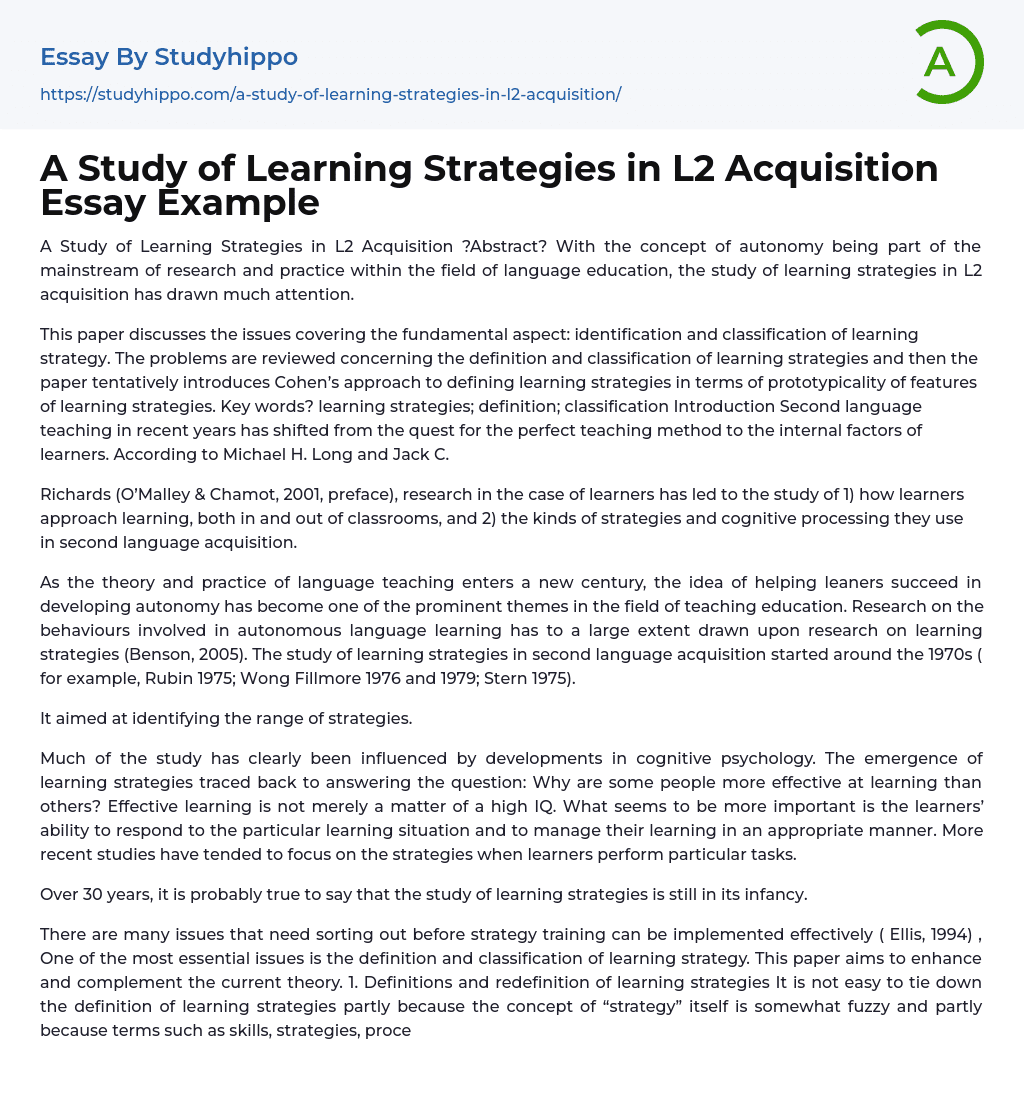

A Study of Learning Strategies in L2 Acquisition Essay Example
Second language teaching in recent years has shifted from the quest for the perfect teaching method to the internal factors of learners. According to Michael H. Long and Jack C. Richards (O’Malley & Chamot, 2001, preface), research in the case of learners has led to the study of
- how learners approach learning, both in and out of classrooms,
- the kinds of strategies and cognitive processing they use in second language acquisition.
As the theory and practice of language teaching enters a new century, the idea of helping leaners succeed in developing autonomy has become one of the prominent themes in the field of teaching education. Research on the behaviours involved in autonomous language learning has to a large extent drawn upon research on learning strategies (Benson, 2005). The study of learning strategies in sec
...ond language acquisition started around the 1970s ( for example, Rubin 1975; Wong Fillmore 1976 and 1979; Stern 1975).
It aimed at identifying the range of strategies. Much of the study has clearly been influenced by developments in cognitive psychology. The emergence of learning strategies traced back to answering the question: Why are some people more effective at learning than others? Effective learning is not merely a matter of a high IQ. What seems to be more important is the learners’ ability to respond to the particular learning situation and to manage their learning in an appropriate manner. More recent studies have tended to focus on the strategies when learners perform particular tasks.
Over 30 years, it is probably true to say that the study of learning strategies is still in its infancy. There are many issues that need sorting out before strategy trainin
can be implemented effectively ( Ellis, 1994) , One of the most essential issues is the definition and classification of learning strategy. This paper aims to enhance and complement the current theory.
Definitions and redefinition of learning strategies It is not easy to tie down the definition of learning strategies partly because the concept of “strategy” itself is somewhat fuzzy and partly because terms such as skills, strategies, processes, and approaches are used differently by different people.
Researchers have not gained a common understanding of learning strategies. Perspectives are so different that Ellis (1994) states that “definitions of learning strategies have tended to be ad hoc and atheoretical ” (p. 533). Some definitions of learning strategies produced by different researchers are as follows:
- Tarone (1980): A language learning strategy is an attempt to develop linguistic and sociolinguistic competence in the target language. The motivation of the use of this strategy is the desire to learn.
- Stern (1983): In our view strategy is best reserved for general tendencies or overall characteristics of the approach employed by the language learner, leaving techniques as the term to refer to particular forms of observable learning behaviour.
- Chomot(1987): Learning strategies are techniques, approaches or deliberate actions that students take in order to facilitate the learning, recall of both linguistic and content area information.
- Rubin (1987): Learning strategies are strategies which contribute to the development of the language system which the learner constructs and affect learning directly.
- Oxford (1989): Language learning strategies are behaviours or actions which learners use to make language learning more successful, self-directed and enjoyable.
- Cohen (1998) : Learning strategies are learning processes which are consciously selected by the
learner. The words “consciously select” are important because they demonstrate the special character of strategy.
The above definitions show that no researchers define language learning strategies in exactly the same way. All these definitions provide insights into understanding the process of learning a language.
How to define learning strategies is crucial in underpinning the framework of researchers’ study. Definition is fundamental to laying the foundation for the areas of research. However, these definitions of language learning strategies reveals some problems. “Learning strategies” is such a broad word that it can refer to the general approaches or specific techniques used to learn a language.
This paper discusses the issues covering the fundamental aspect: identification and classification of learning strategy. The problems are reviewed concerning the definition and classification of learning strategies and then the paper tentatively introduces Cohen’s approach to defining learning strategies in terms of prototypicality of features of learning strategies.
- Interpretation essays
- Plagiarism essays
- Analogy essays
- Learning English essays
- French Language essays
- Language Education essays
- Second Language Acquisition essays
- Teaching English As A Foreign Language essays
- Verb essays
- Coaching essays
- Critical Thinking essays
- homework essays
- Learning essays
- Library essays
- Listening essays
- Literacy essays
- Mentor essays
- Physical Education essays
- Project essays
- Reading essays
- Research essays
- Sex Education essays
- Social Studies essays
- Standardized Testing essays
- Study Plan essays
- Teaching essays
- Academia essays
- Academic And Career Goals essays
- Academic Integrity essays
- Brainstorming essays
- Brown V Board of Education essays
- Brown Vs Board Of Education essays
- Coursework essays
- Curriculum essays
- Distance learning essays
- Early Childhood Education essays
- Education System essays
- Educational Goals essays
- First Day of School essays
- Higher Education essays
- Importance Of College Education essays
- Importance of Education essays
- Language Learning essays
- Online Education Vs Traditional Education essays
- Pedagogy essays
- Philosophy of Education essays
- Purpose of Education essays
- Scholarship essays
- Study essays
- Studying Abroad essays



